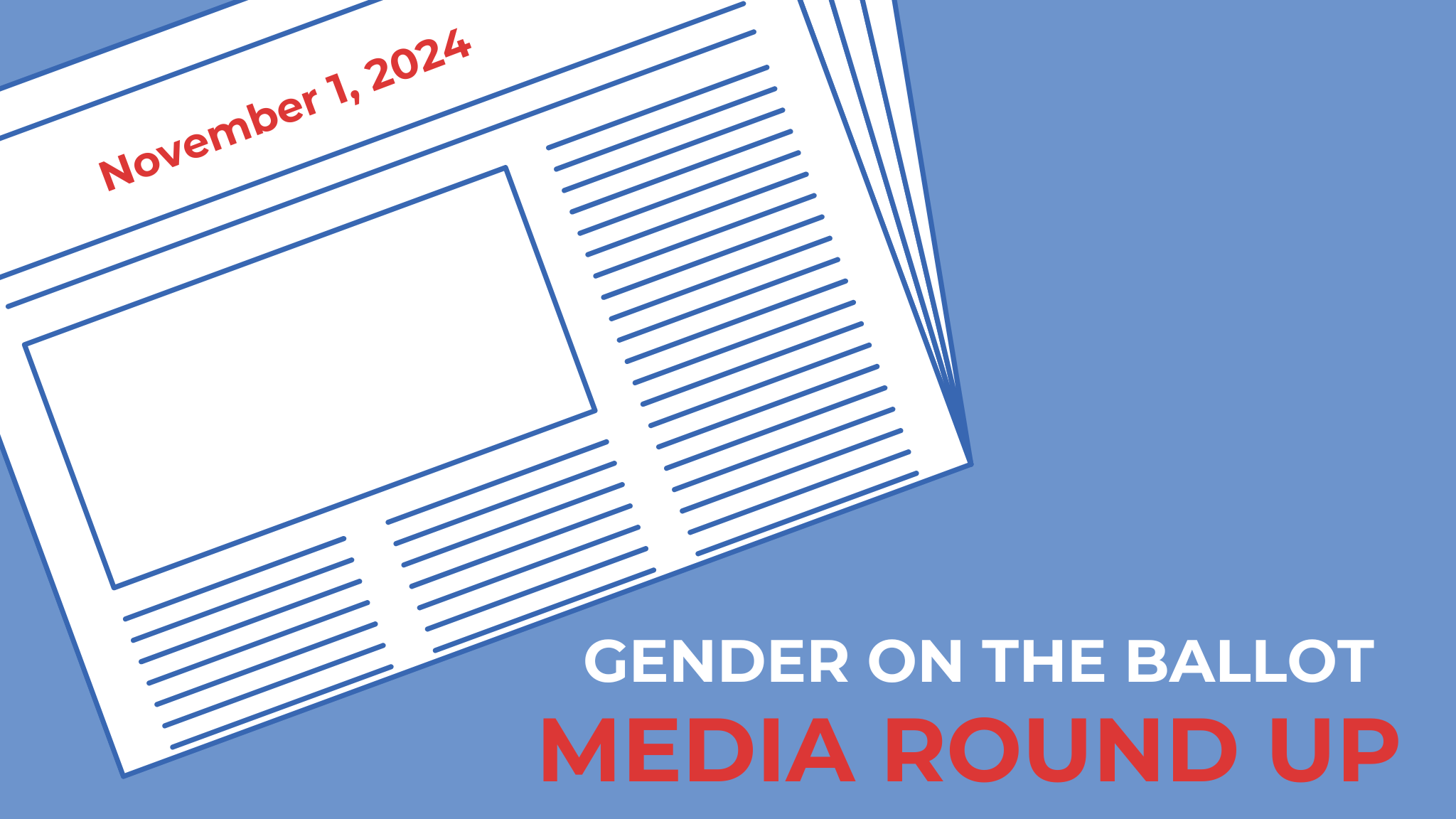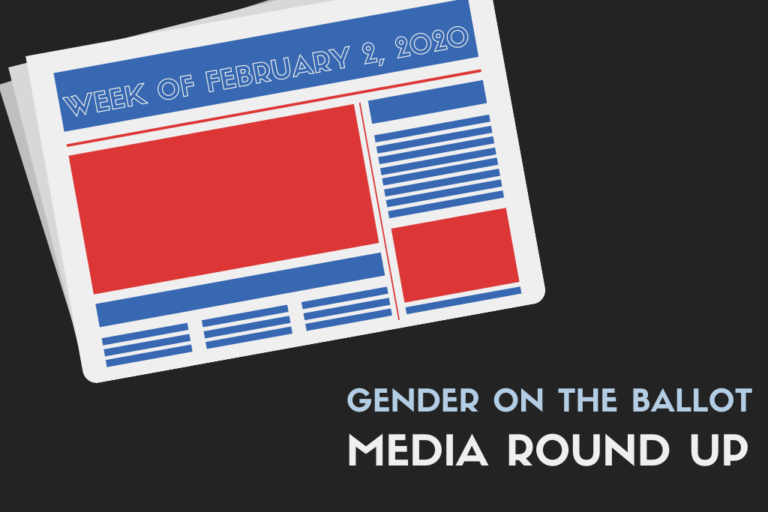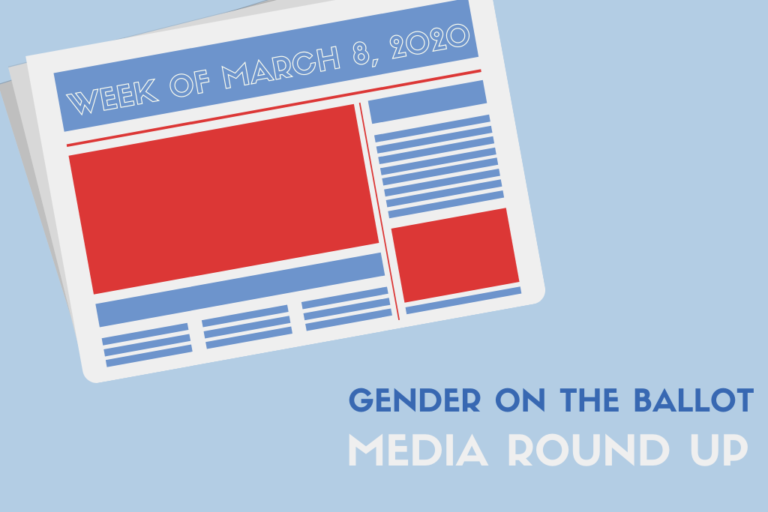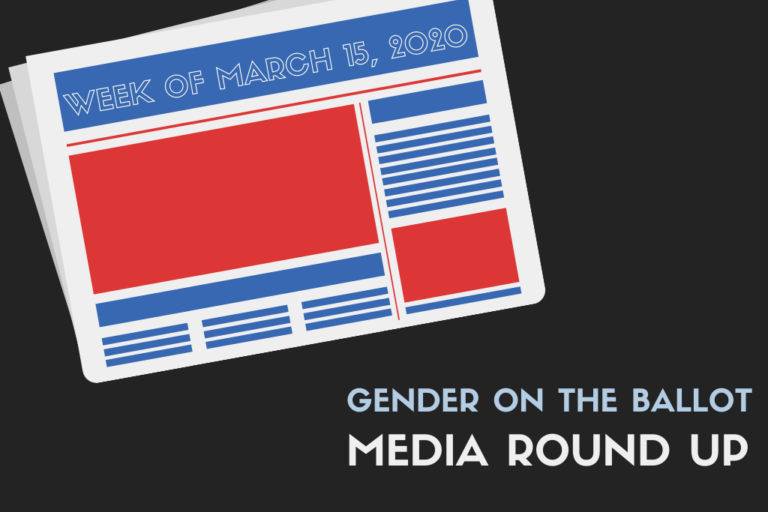Happy Friday! Welcome to our Media Round Up. Each week we’re collecting and sharing our…
Weekly Media Round Up: November 1, 2024

Happy Friday! Welcome to our Media Round Up. Each week we’re collecting and sharing our favorite gender + politics stories. Hitting a paywall? Some sources allow a few free articles without a subscription, and your university or local library may offer free access. For example, AU students, faculty, and staff have access to popular newspapers through the library. Click here to learn more.
Gender Gap and Early Voting
As the 2024 presidential election approaches next week, women are voting early in huge numbers, far outpacing their male counterparts. Across battleground states, there is a 10-point gender gap in early voting so far, with women accounting for roughly 55 percent of the early vote, while men are at around 45 percent, according to a POLITICO analysis of early voting data in key states. The implications of women’s early voting is unclear, but high female turnout is encouraging to Democratic strategists, who see the lack of a surge of male voters as an motivating sign. A new survey of 1,200 Black women voters – a strong voting bloc for Kamala Harris – reveals, however, that enthusiasm is waning among this key group. Eighty-two percent of Black women polled plan to vote in the election, down from 91 percent in September. This drop in the last stretch of the race may indicate women voters’ exhaustion after being inundated with calls, texts, and ads begging them to vote and donate to presidential campaigns.
A Democratic and a Republican Pollster Agree: This Is the Fault Line That Decides the Election
New York Times, Celinda Lake and Amanda Iovino
Democratic pollster and president of Lake Research Partners Celinda Lake and Republican pollster at WPA Intelligence Amanda Iovino explore the gender gap in the upcoming election, focusing on how the gap widens when educational attainment is considered. The general gender gap is 17 points, with Trump ahead by 8 points among men and Harris ahead by 9 points among women, but that gap widens to 43 points when weighing education. Men without college degrees and women with college degrees are at “opposite ends of the spectrum politically” – women with degrees name abortion as a key issue deciding their vote, while both women and men without degrees are more focused on issues affecting their “day-to-day finances or safety.” With such contrasts in priorities between these two groups, “it makes sense that they would have different voting patterns,” the two contend.
See Where A Woman Could Be Elected For the First Time In the House or Senate
Washington Post, Janice Kai Chen and Luis Melgar
This year’s election holds the potential for eight more “firsts” for women’s representation in Congress and gubernatorial positions across the country. Notable candidates to watch include Democrat Lisa Blunt Rochester, who would become both the first woman and first Black person to represent Delaware should she win her Senate race, and Democrat Nellie Pou, who would be the first Latina woman representing New Jersey if she wins the race for the House. Despite “historic increases” in women’s representation over the last few years, women – and women of color, in particular – remain underrepresented in “all levels of politics.” Having more women in public office leads to a “role model effect,” which shapes young women’s perceptions and alters the understanding of who can become a political leader.
Harris and Trump Trade Gender Attacks as He Floats Kennedy for ‘Women’s Health’
New York Times, Katie Rogers, Michael Gold, Kellen Browning, and Reid J. Epstein
On Thursday, Vice President Kamala Harris attacked former President Donald Trump for claiming that he would protect American women “whether the women like it or not.” Her campaign later pounced on a new Trump comment that under a future Trump administration, his ally Robert F. Kennedy, Jr. would “work on women’s health.” Put on the defensive, the Trump campaign then lashed out at top Harris surrogate Mark Cuban for insulting the intelligence of women close to the former president. These gendered attacks took the presidential race from “literal trash talk to gender issues in its closing stage,” as both candidates try to inflict political wounds in the remaining days of their campaign.
At POLITICO’s Women Rule 2024 event, WPI ED Betsy Fischer Martin spoke with Jotaka Eddy, social impact strategist and founder of Win With Black Women, about the upcoming presidential election and the role that the gender gap will have on its results. The two discussed key findings from Gender on the Ballot’s Recent She Votes poll, such as the fact that nearly half of women surveyed believe the 2024 presidential election will be the most significant election of their lifetime. “The bottom line is that women are more engaged in this election, they are excited about it, and they are excited about this change and having Kamala as the nominee,” says Fischer Martin. “If she does win this election, I think it will be because of women.” Watch the full replay here.
Pivotal Policies for Political Parity
As Election Day approaches, Pivotal Ventures, a Melinda French Gates company focused on advancing social progress by promoting gender equality and expanding opportunities for women and families, is closely following key trends affecting women’s political power and the issues resonating most with voters:
- Caregiving and Paid Leave: These issues are center stage, with bipartisan support and strong voter demand for policies that ease caregiving burdens. Candidates are highlighting these “pocketbook issues” as crucial to economic security.
- Women’s Political Engagement: From candidates to election workers, women are mobilizing across roles, driving greater representation and safeguarding democracy. Increased legislative representation and support for mothers running for office reflect the momentum behind women’s impact this election.
Gender Bias and Language on the Campaign Trail
Election day is just four days away, and a hallmark of this cycle persists: sexism. It’s been widely reported that the gender gap in this election is larger than ever, and the reason for this gap seemingly lies in the young male/female vote difference. Vice President Kamala Harris’ campaign has focused on key talking points like reproductive rights and LGBTQ+ rights that appeal more to young women, while former President Donald Trump’s focus has been on values young men align more with, like embracing masculinity and tradition. Elon Musk has joined the conversation as well, with his platform X running inflammatory ads about Kamala Harris by using misogynistic and demeaning language towards women. Distributed by his America PAC, the video features references to Harris being a “c-word”, which then “dupes” the viewer by calling her a communist. This language is nothing new to the rhetoric that Trump has used to talk about Harris, like calling her “mentally impaired” and “Comrade Kamala.” One vocal supporter who is fed up with this language is former First Lady Michelle Obama. Speaking at a Harris rally in Michigan this past weekend, she expressed her frustrations with the double standards that Harris is subjected to over Trump, “I hope you’ll forgive me if I’m a little frustrated that some of us are choosing to ignore Donald Trump’s gross incompetence, while asking Kamala to dazzle us at every turn.” Former Presidential nominee Hillary Clinton expressed similar sentiments about her 2016 race, specifically that sexism is a driving issue for Americans to vote against a woman president.
Removing Barriers to Women in Politics and Business
Women have made great strides in the workforce and as entrepreneurs and political leaders in the past few decades. October 28 marked the 50th anniversary of the Equal Credit Opportunity Act of 1974 where women were allowed to apply for credit cards in their own names, without a male co-signer, and could not be rejected based on current or future pregnancies. This was pivotal for women to become homeowners, start businesses, and be overall independents in society. Despite women starting businesses at twice the rate men have in the last five years, there are still global struggles for entrepreneurial equality. India has seen great advances in increasing women’s entrepreneurial roles, but they still make up only 14% of such. With barriers like hiring costs and childcare, it harms Indian women in contributing to the economy and building successful businesses. Similarly, caregiving and paid leave is a prominent feature of this year’s U.S. presidential election, with 8 in 10 voters wanting candidates to prioritize it. These are major hindrances in women being successful business and political leaders since mothers are often the first to stay home. With increased care, women can exercise their political power and take part in strengthening democracy beyond household contributions. Whether it’s business or politics, when women are supported and uplifted, we all win.
Why Are So Many Women Hiding Their Voting Plans From Their Husbands?
The Guardian, Rebecca Solnit
Vice President Kamala Harris has released advertisements about wives who vote against what their husband says to do, “You can vote any way you want. And no one will ever know.” This reveals a much darker reality about marriages; instead of households, they’re dictatorships and wives are expected to vote the same way as their husbands. Those who have campaigned door-to-door confirm this story, saying wives immediately walk away and leave their husbands to talk, but meet the campaigners outside or whisper their defiant vote. Harris’ campaign has caught flack from Republicans for releasing these ads, but it represents a harsh truth for women living in households who don’t have equal voices.
‘Like It or Not’: In One Quote, Trump Distills the 2024 Gender Gap
The Washington Post, Philip Bump
While speaking at a rally in Wisconsin on Wednesday, Trump made a vow to “protect” women in this country, despite admitting that his staff had discouraged him from doing so. He justified this comment by saying he’s “president” and implying it’s his duty, “‘Well, I’m going to do it. Whether the women like it or not, I’m going to protect them.’” Trump is documented saying derogatory things about women and was found liable for sexual assault, and has directed his campaign strategy toward gaining the support of young men. In a post-Roe world, his recent comment has been met with skepticism during a campaign that has already generated an enormous gender gap.
The Group Chat That Secretly Runs Congress
Elle, Kayla Webley Adler
Women are increasingly filling senior level positions on Capitol Hill, including nearly one third of chiefs of staff. The COS balances the many issues and pressures of getting things done in Congress, and not surprisingly, professional networks are an important part of the process. A text group chat of over sixty female chiefs also meet for drinks, vent about work and personal issues, and the unique dynamic of working in a political environment. Not surprisingly, issues impacting women on the Hill are the same as other working women: work-life balance, childcare and professional opportunity. Many speak of the challenges that such a demanding position has, but they also highlight the amazing experience and connections they’ve made with other Hill women. It’s a demanding position, but these women have found community and passion in it.






